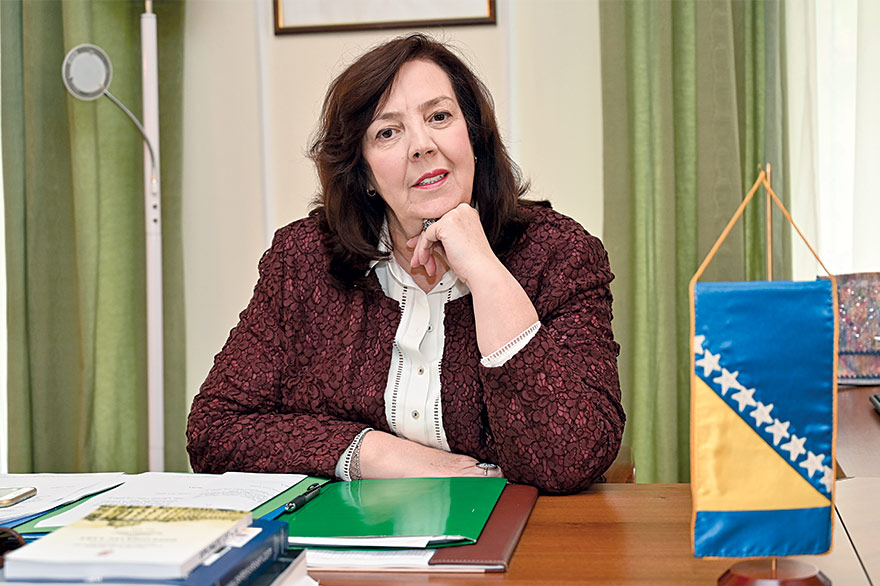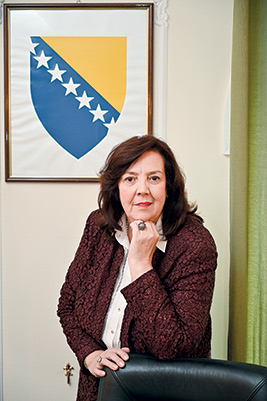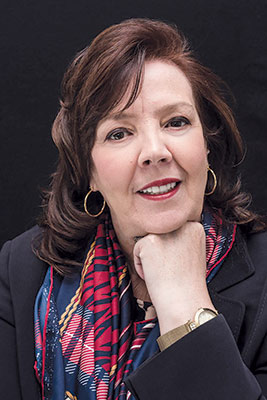As next-door neighbours, in the waiting room for entry into the chambers of Europe, we should resolve our open issues through constructive dialogue, mutual respect and equal positions in all negotiations – Aida Smajić
The new ambassador of B-H in Belgrade, Aida Smajić, says that she’s starting her term in Serbia with optimism, in the belief that some unresolved issues, such as defining an interstate border, can be agreed upon during her stay in Belgrade. In her first interview with CorD Magazine, Ambassador Smajić explains how procedural preparations are underway for the construction of the Belgrade-Sarajevo highway, and when it comes to considering new initiatives for the regional integration of the Western Balkan countries, she says that they can be considered, but only provided they don’t redirect energy from elsewhere and don’t represent an additional financial cost that would slow down reforms aimed at advancing the primary objective of EU membership.
Your Excellency, you arrived in Belgrade recently as the new ambassador of Bosnia- Herzegovina to Serbia. What have you set as the priorities of your mandate?
When it comes to the priorities of my diplomatic mandate here in Serbia, we can say that the top priority is improving bilateral relations, which aren’t antagonistic at this moment, but nor are they good, because such a qualification means that there’s something “bothersome” in those relations. I think those are issues that have plagued our relationships for many years. As next-door neighbours, in the waiting room for entry into the chambers of Europe, we should resolve our open issues through constructive dialogue, mutual respect and equal positions in all negotiations. When it comes to the aspect of mutual respect, then I must refer to the UN Charter, and both countries are members of this global international organisation. Each country is an equal member of the UN and has an obligation to respect the UN Charter. When we speak together like that and when we sit opposite each other with such starting positions, our conversations will be much easier and we will resolve our open issues to our mutual satisfaction.

In the preamble of the text of the UN Charter adopted in San Francisco in 1945 it emphasises “We the peoples of the united nations determined to save succeeding generations from the scourge of war, which twice in our lifetime has brought untold sorrow to mankind, and to reaffirm faith in fundamental human rights, in the dignity and worth of the human person, in the equal rights of men and women and of nations large and small, and to establish conditions under which justice and respect for the obligations arising from treaties and other sources of international law can be maintained, and to promote social progress and better standards of life in larger freedom…” And still today, 74 years after the adoption of that UN Charter, it is necessary to constantly repeat these words to all those who’ve forgotten them, to those who did not want to respect them and to those who still don’t want to hear them. If just one of the numerous open and unresolved issues between our two neighbouring countries is resolved during my term I’ll be satisfied. I will endeavour to fulfil this goal and, of course, more than that.
I would like to emphasise that I don’t consider that any of the representatives of current policies in the region would dare to embark on such a misadventure, causing or participating in new armed conflicts
At what kind of tempo will the Belgrade- Sarajevo highway link project be realised?
Construction of the Sarajevo-Belgrade highway is a large, imposing infrastructure project that’s worth 1.5 billion euros. With its construction, both countries would confirm their clear commitment to stronger and faster connectivity, but would also confirm our safe “route” to all EU countries and our strategic foreign policy goals – namely European and NATO integration (in the case of Bosnia-Herzegovina). At the beginning of October, following the trilateral meeting of B-H-Turkey-Serbia, we attended the official launch of works on the section of the highway at the Sremska Rača border crossing.
The process of forming a Council of Ministers of Bosnia and Herzegovina level was initiated a few days ago, after more than a year of failing to find a compromise on various political issues. Specifically, by naming a mandate holder for the composition of the Council of Ministers of B-H and the adopting of the Reform Programme of Bosnia and Herzegovina, which will be sent to NATO Headquarters in Brussels (this is not the Annual National Programme (ANP) but it is its contents), it is almost certain that we will also very quickly receive this collective body of the government in B-H and that we will start working on all essential reforms that were halted in the previous period. I think that, following the appointment of the Council of Ministers, activities on construction of the highway will be intensified and that the relevant ministries and the expert group will move faster with the implementation of the identified operational obligations of Bosnia-Herzegovina. Here I’m primarily referring to the drafting of project documentation and finding the most affordable way of financing such a major project.
Do you believe that Bosnia-Herzegovina and Serbia can resolve the issue of the interstate border during your term in Belgrade?
We in Bosnia-Herzegovina have identified which open issue is a priority, and that’s the issue of signing the State Border Extension Agreement. That agreement was initialled back in 2003 and is the most significant open issue burdening our bilateral relations. By permanently resolving this open issue, the Republic of Serbia would demonstrate and prove its respect for Bosnia-Herzegovina as a sovereign country, the sovereignty of which naturally also implies territorial integrity.

As the ambassador in your country, I’m here to represent and promote the state of Bosnia- Herzegovina and all of its positive reforms, and to respect the Constitution and the laws of the country. Being an optimist when it comes to the resolving of the numerous issues that burden our overall relations is my personal right and ultimately a character trait of mine.
What is completely clearly, and has been proven countless times institutionally, is that B-H respects the sovereignty and territorial integrity of its neighbours, and the credibility of such a stance was demonstrated through the signing of the border agreement with Montenegro and through tangible proposals and a genuine intention to ratify the same legal act, i.e. to negotiate and sign with our other neighbours. Finalising these bilateral issues would have remarkable symbolism in terms of mutual trust and cooperation.
B-H Presidency Chairman Zvizdić, in a recent meeting with the French president, contradicted his earlier assessment that B-H is a ticking time bomb on the border with Croatia. How would you respond to the views of some Western analysts who still see the region as a possible crisis ho spot and don’t exclude the possibility of armed conflicts?
I can freely state that French President Macron didn’t have, or doesn’t have, full and truthful information on the reforms and efforts being exerted by the official authorities of Bosnia- Herzegovina as part of the international coalition for the fight against terrorism. Bosnia- Herzegovina remains strongly committed to being part of the global fight against terrorism and will continue to support the coalition in both diplomatic and political terms, but also in accordance with its possibilities. When you ask me if I think this area is a crisis hotspot and if I think there will be some new armed conflicts, I would like to emphasise that I don’t consider that any of the representatives of current policies in the region would dare to embark on such a misadventure, causing or participating in new armed conflicts. The interest of the international community, and here I mean the evident interest of the quint of countries in this area, has grown markedly in recent months; international diplomats and negotiators have intensified their engagements in a desire to “untangle” this knot in finding a compromise and agreeing to continue EU and NATO reforms, especially in Bosnia- Herzegovina.
We must promote and choose policies and individuals who advocate for the idea of a united free and democratic Europe, a place where all citizens will live with dignity and with the same rights
I consider that the Council of the European Union and France, which caused a great injustice to Albania and North Macedonia with its veto, will now have to observe the diplomatic offensive of U.S. negotiators and diplomatic influence with the aim of giving new impetus to candidate countries and potential candidate countries in the reforms that have been instigated. Anyone in this region that has resorted to some armed “warfare” as a way to try to resolve its territorial claims and aspirations, and attempted to change internationally recognised borders by force, has been defeated. There are no changes to borders on the territory of the Western Balkans, as concluded at numerous conferences and summits held in the region in recent years (here I would particularly emphasise the position of Germany regarding the issue of changing existing borders in the Western Balkans).
I believe that the affirming of internationally recognised borders and the signing of initialled agreements would end speculation on territorial pretensions, secession, division, ethnic exchanges and the hidden but real intentions of individuals to redraw existing borders. We must promote and choose policies and individuals who advocate for the idea of a united free and democratic Europe, a place where all citizens will live with dignity and with the same rights. These rights must be guaranteed to them by the countries that are member states and those that aspire to membership in the future.
Are you concerned about the slowdown in the pace of the European integration of Western Balkan countries?
Of course I’m concerned about the slowdown in European integration. I would personally like to see all Western Balkan countries, and especially my own country, become full members of the EU and NATO. We in B-H are working diligently to achieve this goal, and all the reforms that have been implemented to date on the path to EU accession are to be congratulated precisely due to the weight of the current political environment and the circumstances in which they were implemented – with the major presence of obstructions and retrograde attempts to halt positive processes.
When we add to this the negative rhetoric and constant discouraging and destructive narrative, then every reform undertaken in B-H is to be commended and they each represent a great success of the state. When I say that we’re working diligently, I’m referring to all pro-Bosnian political forces and industrious people in institutions, politicians who act palliatively with their rhetoric, giving hope to the citizens of Bosnia-Herzegovina that their country will one day be a full member of the EU and the NATO Alliance. History remembers individuals only through their deeds, whether good or bad, and that is the role of history. It records our constant activities and our actions.
 It is up to us to assign a role for ourselves, whether positive or negative. Today we define and declare people and individual historical figures primarily on the basis of the good that they did, firstly for their own country and its citizens, and then later the extent to which their deeds contributed to the common good of civilisation as a whole. And today, 74 years after the end of World War II, the unification of Europe, every citizen of Europe should know who the criminals were, what they said and what they collaborated on, and who were the greats of the last century, like Winston Churchill, Nelson Mandela or Martin Luther King Jr. Given the strenuous and major political reforms implemented by North Macedonia and Greece, and the reforms conducted by Albania, they shouldn’t have been so easily undermined and somehow put “on hold”.
It is up to us to assign a role for ourselves, whether positive or negative. Today we define and declare people and individual historical figures primarily on the basis of the good that they did, firstly for their own country and its citizens, and then later the extent to which their deeds contributed to the common good of civilisation as a whole. And today, 74 years after the end of World War II, the unification of Europe, every citizen of Europe should know who the criminals were, what they said and what they collaborated on, and who were the greats of the last century, like Winston Churchill, Nelson Mandela or Martin Luther King Jr. Given the strenuous and major political reforms implemented by North Macedonia and Greece, and the reforms conducted by Albania, they shouldn’t have been so easily undermined and somehow put “on hold”.
These countries deserve candidate status, B-H also deserves that, along with all the Western Balkan countries have agreed to work seriously to meet the criteria for enlargement. Likewise, NATO integration is also of strategic importance to the future and to the development of my country. That is the only realistic option, looking at the political, social and security aspects of B-H society. Certain countries experienced an economic flourishing when joining NATO – not immediately after accession, of course, but rather after a certain period. It is obvious that, from this side, a country’s membership in NATO also brings unique economic benefits. A unified, complete and secure Bosnia-Herzegovina is key to the stability of the Western Balkans.
That’s why the European Union, in its enlargement policy, should have a much more careful and caring attitude and approach to B-H, because that relates to the stability of the EU itself. A good example of such an approach was the German-British initiative that resulted in significant progress for B-H on the road to Europe. That and that kind of approach should be continued. Our relationships should be based on the principles of reciprocity and mutual respect. Inter-state disputes and open issues, including the issue of borders, must be resolved exclusively in accordance with the principles of international law. B-H does not have, nor has it ever had, any claims towards its neighbours. We expect the same attitude towards Bosnia-Herzegovina from our neighbours.
Today, 74 years after the end of World War II, the unification of Europe, every citizen of Europe should know who the criminals were, what they said and what they collaborated on, and who were the greats of the last century, like Winston Churchill, Nelson Mandela or Martin Luther King Jr
How is the Serbian president’s initiative regarding a new form of regional integration, the so-called “Mini Schengen”, viewed in Sarajevo?
B-H is participating actively in numerous regional initiatives and forums, from SEECP, via CEI, JJI, the Union for the Mediterranean and CEFTA, to many other regional and multilateral organisations that have long since established themselves on the territory of Europe and around the world. Everything that can contribute to the better progress of my country on economic, social, political and international fronts, we truly support by giving our contribution to the work of these numerous initiatives, organisations and forums. I am of the opinion that anything that would in any way disrupt B-H, or at least momentarily distract and detract from intensive work on reforms towards the Euro-Atlantic path or full membership – something that would deprive it of energy as a country and waste additional financial and human resources – should not be a priority.
It is not necessary for us to constantly observe the Western Balkans as some mini-zone or micro-region; the further fragmentation of our strategic foreign policy goals does not benefit any country in this area that we mutually share. B-H citizens will adopt its position on the “Mini-Schengen” in accordance with procedures and after the serious analysis of institutions, the business community and experts. We have received some assurances that this initiative does not represent an attempt to create a substitute for EU integration or to derogate existing regional agreements such as CEFTA, because EU and NATO integration remain our primary focus.
| PRIORITIES
When it comes to the priorities of my diplomatic mandate here in Serbia, we can say that the top priority is improving bilateral relations |
MUTUAL RESPECT
When it comes to the aspect of mutual respect, then I must refer to the UN Charter, and both countries are members of this global international organisation |
EU CANDIDATES
Given the strenuous and major political reforms implemented by North Macedonia and Greece, and the reforms conducted by Albania, they shouldn’t have been so easily undermined and somehow put “on hold” |
|---|